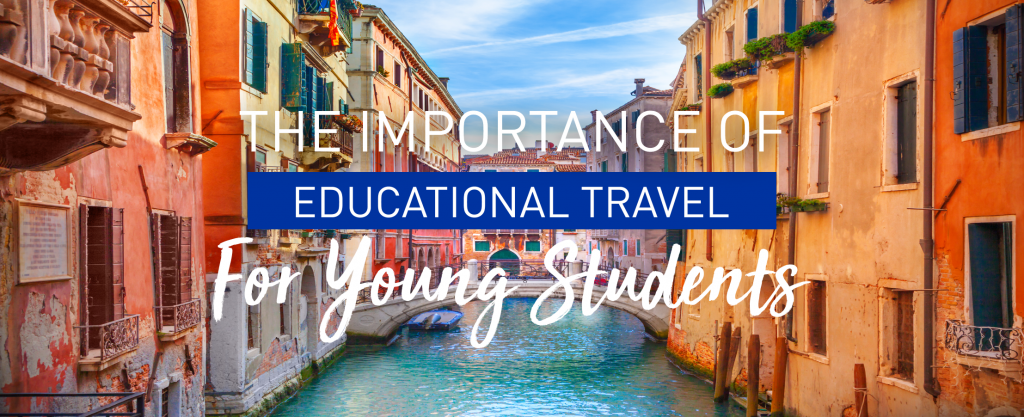The Importance of Educational Travel for Young Students

Date: March 3, 2021
As we enter a full year of living through the COVID-19 pandemic, the question of when and how student travel will resume is on the minds of educators around the world. Will schools shut down travel clubs indefinitely? Is student travel really that important? Should it be allowed? Do the benefits outweigh the risks? Given these pressing questions, I thought I’d share a story from my very first educational tour to highlight the importance of travel experiences for our youth.
My very first Explorica tour, Rome, Florence, and Venice, departed in July of 2008. This popular tour starts in Rome before heading to Assisi, Florence, Pisa, Venice, and Verona, finishing up in Milan. My colleague and I were piggybacking this tour with students from small-town Ohio. They were a very friendly group made up of some of the most popular kids at the school—we had the prom king and queen, the head of the cheerleading squad, the football team’s quarterback, and a few other “in-group” students. But there was one girl on the tour, we’ll call her Sally, who, as a member of the LGBTQ+ community, was shunned from the in-group. She was shy and quiet, and at different points throughout the trip, my colleague and I heard the others make insensitive and ignorant remarks behind her back.
Toward the end of our trip we stayed in Lido de Jesolo, a quaint beach town outside of Venice that sits right on the Adriatic Sea. Most of our groups stop there while visiting Venice, as it’s very safe and the kids love having some beach time after busy travel days. On our last night in the area, the adults on the tour organized a dinner on one of the islands near Venice, giving the students a free night to stay at the hotel or walk around town. Not wanting the kids to be bored or get into trouble, my colleague and I offered to take them on a little excursion.
We brought them to an all-ages karaoke lounge near the hotel, thinking it would be fun to have them sing some songs and have a safe night together in one spot. Sally was with us, and I imagined that as a shy and slightly alienated student, going to a karaoke lounge was her worst nightmare. As you’d expect of the popular students, they got up on stage and sang their hearts out, getting cheers and high-fives from their peers. It was confidence and popularity on full display.
And then Sally got up to sing. I can’t remember what song she sang (or if she was a talented singer), but I remember feeling proud of her for getting up there and anxious about the reaction I expected from her classmates. To their credit (and my surprise), when Sally was finished, she was met with an eruption of applause and cheers and high-fives—well above the praise given to her classmates who sang before. Afterward, Sally went back to where she was sitting by herself in the corner.
As the next popular student got up to sing their song, I looked over at Sally. She was staring off, not really paying attention. Then she lowered her head and a huge smile slowly drew over her face. She was beaming with pride in herself. She had overcome a lot more than just stage fright in getting up there to sing. She had stood in front of her peers, the most popular kids at the school, the ones who judged her for who she is, and she showed them that she belonged, too. This was the moment when the importance of educational travel really clicked for me.
I know many kids in high school experience an onslaught of ridicule, bullying, and shame. Clubs and cliques inevitably determine your worthiness and acceptance from others, and it’s a battle every single day that too many teens must face. But sitting in that karaoke lounge, halfway around the world, singing songs and cheering each other on, those kids from Ohio were simply a group of friends having the same incredible experience together. There was no in-group or out-group. The stresses of school life didn’t exist in that time and space—not for Sally, and not for the other kids, either.
After our karaoke night, the group’s dynamic changed. They bonded and saw something in each other that connected them because of this shared experience. That’s the magic of travel: it forces you outside of your comfort zone, and it makes you mature and grow and become a more whole and accepting person. Sally experienced this with her peer group, which I’m confident would not have been possible if they had stayed within the walls of their high school.
If you’re on the fence about travelling with students again when it is safe to do so, I hope you’ll draw some inspiration from Sally’s story. The experience is too important to miss—as we say at Explorica, the experience is everything.
By: Kurt Wicklund
Kurt Wicklund is a Senior Account Manager from our Toronto office and has been working with WorldStrides since 2008.


